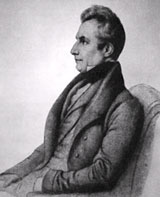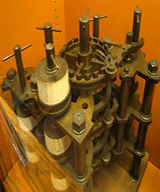Computing History Timeline
The First Mechanical Computer
 first device that might be considered to be a
computer in the modern sense of the word was conceived by the eccentric British
mathematician and inventor Charles Babbage (1791-1871).
first device that might be considered to be a
computer in the modern sense of the word was conceived by the eccentric British
mathematician and inventor Charles Babbage (1791-1871).
In Babbage's time, mathematical tables, such as logarithmic and trigonometric functions, were generated by teams of mathematicians working day and night on primitive calculators. Due to the fact that these people performed computations, they were referred to as “computers.” Over the course of time, the term computer became associated with machines that could perform the computations on their own (in fact the term computer was used as a job description – rather than referring to the machines themselves – well into the 1940s).
Babbage hated the tedium associated with performing calculations by hand, and in 1812 he said “I wish to God these calculations had been performed by steam.” In 1822, Babbage proposed building a machine called the Difference Engine that could calculate these tables automatically.
The Difference Engine was only partially completed when Babbage conceived the idea of another, more sophisticated machine called an Analytical Engine. The Analytical Engine was intended to use loops of Jacquard's punched cards to control an automatic calculator, which could make decisions based on the results of previous computations. This machine was also intended to employ several features subsequently used in modern computers, including sequential control, branching, and looping.
Working with Babbage was Augusta Ada Lovelace (1815-1852), the daughter of the English poet Lord Byron. Ada, who was a splendid mathematician and one of the few people who fully understood Babbage’s vision, created a program for the Analytical Engine. Had the machine ever actually worked, this program would have been able to compute a mathematical sequence known as Bernoulli numbers (Bernoulli numbers are a sequence of rational numbers with deep connections in number theory. They are closely related to the values of the Riemann zeta function at negative integers.).
 Based on this work, Ada is now credited as
being the first computer programmer and, in 1979, a modern programming language
was named ADA in her honour. (In their spare time Babbage and Ada also attempted
to create a system for predicting the winners of horse races, but it is said
that they lost a lot of money!)
Based on this work, Ada is now credited as
being the first computer programmer and, in 1979, a modern programming language
was named ADA in her honour. (In their spare time Babbage and Ada also attempted
to create a system for predicting the winners of horse races, but it is said
that they lost a lot of money!)
Babbage worked on his Analytical Engine from around 1830 until he died, but
sadly it was never completed. It is often said that Babbage was a hundred years
ahead of his time and that the technology of the day was inadequate for the
task. Refuting this is the fact that, in 1834, two Swedish engineers called
George and Edward Scheutz built a small Difference Engine based on Babbage’s
description.
It is said that one of the
actors that got in the way of Babbage completing his invention was his inability
to stop tinkering.
by Zahra Hijazi

